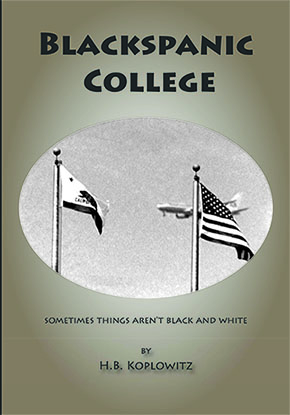09/03/09 – 09/10/09
Sometimes Things Aren’t Black and White:
H.B. Koplowitz’s Blackspanic College
by Brian Wilson
H.B. Koplowitz, author of
Carbondale After Dark, will return to Carbondale Friday, September 4 to promote his newest book,
Blackspanic College at the Bookworm.
A native of Southern Illinois, Koplowitz has spent the past several years living in Southern California.
Blackspanic College (Dome Publications, 166 pages, paperback, $19.95) is a non-fiction account of the author’s four-year stint teaching at a community college in South-Central Los Angeles. But more than simply a memoir, it is also a stimulating and thoughtful examination of the racial divisions that continue to exist within our culture.
Blackspanic College is divided into three major sections, with each chapter covering a different semester between 1998 and 2002, the years Koplowitz taught at Southland. The first section, “H.B. Loco,” recounts the author’s first two years at the college, when he found himself adjusting to his role as a white teacher in a predominantly black community, and befriending several of his students in his role as faculty advisor for the school newspaper. The second section, “Fungus Amongus,” details the events leading to Koplowitz being unjustly deemed a racist by one student, and Koplowitz’s frustrations at being the target of harassment that led to much of the student body turning against him. The third and final section, “Redemption,” portrays the author regaining acceptance from his students after they come to stop judging him on hearsay and begin getting to know what he really believed.
At the center of
Blackspanic College is the transformation that occurs not only among the students of Southland College, but within Koplowitz himself. In the first chapter, the author expresses his insecurity about accepting the position at Southland College: “[T]ruth be told, I tend to be uneasy around blacks. Scared of getting mugged, guilty about the slavery thing, intimidated by the jive. I think of it as a phobia– Afrophobia– like homophobia, which is an irrational fear of gay people.”
But Koplowitz now tells
Nightlife, “I think the more familiar anyone becomes with ‘others,’ the more comfortable they become, so I suppose I’m less uncomfortable now. I’m not a racist, but I’m not color blind, either. In writing the book, I felt that to honestly portray my own character, I had to carve out some gray area between racist and non-racist, a person who was fearful but not hateful, and again, I gave the condition a nickname– Afrophobia. I think various social phobias are more common than we let on, because we tend to be ashamed of our fear, and perhaps one way to deal with fear is to pretend it’s not there. But personally, I think acknowledging our fears is the first step toward dealing with them.”
At the end of
Blackspanic College, Koplowitz writes that he hopes the book “doesn’t read like just a settling of scores.” While one aspect of the book clearly involves the author’s coming to terms with the student who caused his personal and professional grief, the work seems much more about the nature of his experiences during this time, both positive and negative.
Koplowitz states that “my intention in writing the book was to try to preserve some memories that were precious to me, in a way that might be interesting to others as well. But… the process of writing it down was also therapy, as I had to analyze as well as recount what happened, and the most painful part was going back over the semester the student called me a racist.”
Although very different in terms of content and form,
Blackspanic College feels in many ways like a logical progression from
Carbondale After Dark. Like Koplowitz’s earlier work,
Blackspanic College pays sharp attention to historical detail and is imbued with the strong personal presence of the author. But whereas the focus of
Carbondale After Dark was upon the events of a specific historical period,
Blackspanic College examines cultural issues that are ongoing and as relevant as ever.
Koplowitz states that he feels the connection between the two books is that they both “take on taboo subjects. In
Carbondale After Dark, it’s the history of ‘the Strip,’ which civic leaders have understandably tried to suppress…. In
Blackspanic College, the taboo subject is race, which, understandably, a lot of people would also like to suppress, or not talk about. Especially nowadays, when just about anything you say about race can be turned into a gotcha moment. The politically correct thing to be is color blind– not just treat everyone the same, but not acknowledge our diversity. But the more we ignore our differences, the less vibrant we become as a culture. If there were only one race, the world might be a calmer place, but it wouldn’t be as interesting.”
Like this:
Like Loading...


